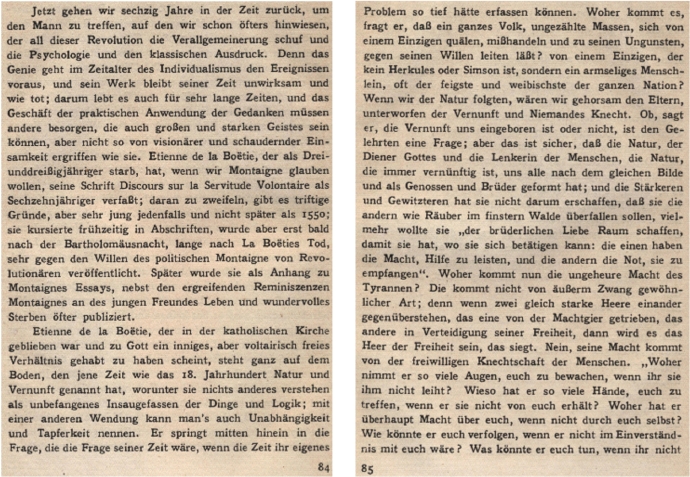Étienne de La Boétie
Against Voluntary Servitude
- Discourse on the fall of tyrants -

Gustav Landauer: Die Revolution (1907). S. 84-91.
[Let us go back sixty years to meet a man who we have already named a couple of times; a man who conceptualized revolution, gave it a psychology and a classical appeal. This ought not to surprise us. In the era of individualism, geniuses precede events. Their work often remains ineffective for an extended period, appearing to be dead. It remains alive, however, waiting for others to apply it practically; men of great and strong spirit, even if they do not necessarily have identical visions and do not share the same fate of solitude.
According to Montaigne, Etienne de La Boétie, who died at the age of thirty-three, wrote his Discours sur la Servitude Volontaire [Discourse on Voluntary Servitude] at the age of sixteen. Even if we cannot be certain of the exact age, he was very young and wrote it no later than 1550. A few copies of the text circulated for some time, but it was only shortly after the St. Bartholomew’s Day massacre – and long after La Boétie’s death – that the text was officially published by some revolutionaries, against strong political objections by Montaigne. The treatise was later republished as an appendix to Montaigne’s Essays, together with Montaigne’s moving memories of the life and death of his young friend.
Etienne de La Boétie always remained within the Catholic Church and seemed to have an intimate but free-spirited Voltairian relationship with God. He embraced what his times (and the entire 18th century) called reason and nature, i.e., an objective perception of things and logic, with independence and courage as associated values. La Boétie was posing the question of his era, if people had only sufficiently understood it: how can an entire people, consisting of countless individuals, allow a single person to torture them, abuse them, and rule over them against their interests and against their will? A person, no less, who is neither Hercules nor Samson, but a pathetic man, often the most cowardly and feminine of the whole nation. If we followed nature, La Boétie proclaims, we would obey our parents, defend reason, and live as nobody’s servant.
La Boétie does not want to argue about whether we are born with reason
or not. He leaves this question to the “scholars.” What is important to
him is that nature serves God, guides humanity, is always reasonable, has
formed us all according to the same image, and has created us as comrades
and brothers. In his view, nature has not created some who are stronger
and smarter than others so that they can prey on them like robbers in the
woods, but “to allow brotherly love to flourish, and to provide help to those who need it.”
So where does the enormous power of the tyrant come from? External coercion cannot be the answer. If two equally strong armies face each other, and one is driven by lust for power, while the other is driven by the will to defend its freedom, then the army of freedom will win. The tyrant’s power comes from the voluntary servitude of humanity.
“How can he [the tyrant] have so many eyes with which to
control you if you do not lend him your own? How can he
have so many hands to hit you if you do not provide them?
How can he ever have power over you if not through you?
How can he persecute you if you do not allow him to? What
can he do to you if you are not the dealer of the thief who
robs you, and the helper of the murderer who kills you? What
can he do to you if you are not your own traitor?”

